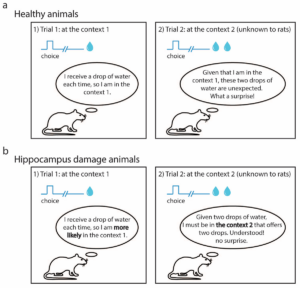 Featured Paper of the Month – January 2025
Featured Paper of the Month – January 2025
Published in Nature Communications by Zhewei Zhang, Yuji Takahashi and Geoffrey Schoenbaum et al. of the NIDA IRP Behavioral Neurophysiology Neuroscience Section.
Summary
The hippocampus (HC) is a brain region that helps us understand our surroundings and predict what might happen next, especially when rewards are involved. It sends information to neurons that release dopamine, a chemical that generates essential “teaching signals” and helps us learn from our experiences.
To understand how this works, we studied rats with hippocampus damage as they played a smell-based game. The game involved four contexts with different reward structures changing over time. What we discovered was fascinating: without a working hippocampus, the rats could only focus on what was happening right now to estimate the current context, instead of using their past experience or prior knowledge.
Thus, we believe that HC provides critical information about the broader context, helping dopamine cells teach our brain not just based on immediate observations but also from past experience. This allows us to learn and make smarter decisions in complex situations.
Publication Information
Expectancy-related changes in firing of dopamine neurons depend on hippocampus Journal Article
In: Nat Commun, vol. 15, no. 1, pp. 8911, 2024, ISSN: 2041-1723.
